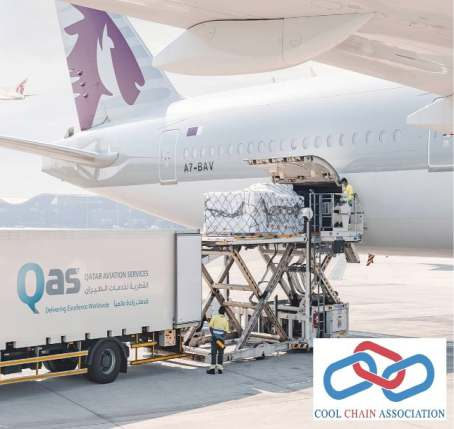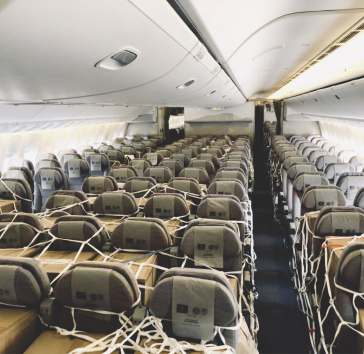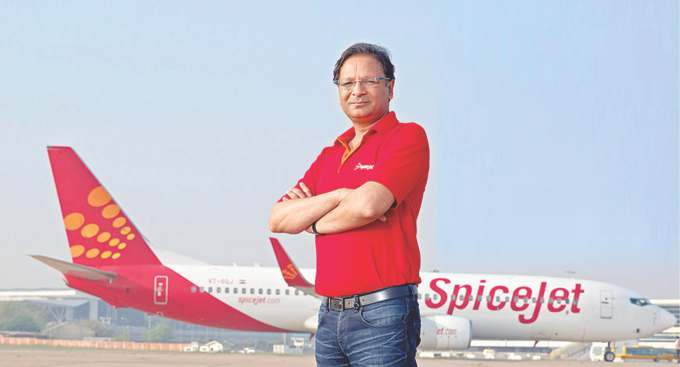As the use of Bio-LNG is gaining traction in Germany, energy company Shell is supplying this sustainable version of liquefied natural gas (LNG) derived from agricultural waste to supermarket cooperative EDEKA Minden-Hannover which operates thousands of stores and several warehouses for its wholesale market.
The supermarket cooperative has dedicated three of its IVECO S-WAY natural gas trucks to the project. Apart from EDEKA, two other customers are also in the pilot run. Each one will run three trucks on the Bio-LNG provided for a year, significantly reducing their carbon emissions during the period.
EDEKA Minden-Hannover has a long-standing commitment to sustainability and is bent on making its goods supply chain as environmentally friendly as possible. This has led the company to address the sustainability of its fleet, which now includes 10 IVECO Stralis NP and 40 IVECO S-WAY natural gas trucks.
“The conversion of our vehicle fleet, which represents the backbone of all of our logistics activities, is a key lever in reducing our carbon footprint,” said Thomas Steinlein, Head of Fleet and Transport Management at EDEKA Minden-Hannover.
“The use of Bio-LNG throughout would of course be a major step forward towards achieving zero emissions. We are therefore delighted to participate in this pilot project to show what this advanced biofuel can contribute to achieving this aim.” However, another important aspect is also the avoidance of nitrogen oxides (NOx) and particulate matter (PM): “Our vehicles operate primarily and frequently in highly polluted inner cities. By using LNG or even Bio-LNG, we are already considerably reducing these pollution values.”
Road to decarbonization
The Bio-LNG used by Shell is produced from agricultural waste. It meets the criteria of the European Union’s revised Renewable Energy Directive (REDII), and is a sustainable circular economy product. Accordingly, EDEKA Minden-Hannover and the other customers will receive statements with regard to the product’s sustainability and carbon benefits.
Head of Shell Germany Fabian Ziegler views this Bio-LNG trial run in Germany as a very important step towards the further expansion of Shell’s Bio-LNG plans for long-distance haulage.
“A Nordsol Bio-LNG plant is scheduled to begin production as soon as this summer, and will feed into our European supply network. After that, we will be progressing in leaps and bounds, as we have submitted a planning permission application in Cologne for a 100,000 tonne plant for the production of Bio-LNG at the Energy and Chemicals Park Rheinland, and hope to break ground this autumn,” he said.
“This would enable us to supply our Shell LNG filling stations in Germany and their customers with Bio-LNG throughout the country as early as 2023, and help to reduce the carbon emissions caused by long-distance haulage by up to a million tons,” he added.
IVECO’s Green Fleet
The IVECO Stralis NP and the IVECO S-WAY natural gas in EDEKA Minden-Hannover’s fleet are equipped with Cursor 13 natural gas engines that comply with Euro VI step D emissions standards, can run on 100% Bio-LNG of the quality available on the market.
No technical modifications or special adaptations are needed to operate on Bio-LNG, and the warranty terms and service intervals are the same as when running on diesel. The two large 54- litre tanks of a 460-hp 4×2, IVECO natural gas truck can hold at least 390 kg of Bio-LNG, providing autonomy of up to 1,600 kilometres without refuelling.
Compared to a diesel truck, they emit considerably less nitrogen oxide and particulate matter emissions, and the CO2 is up to 95 percent lower. This means unrestricted access to low emission zones in city centres, now and in the future.
In addition to their low fuel consumption, the IVECO natural gas tractor units in EDEKA Minden-Hannover’s fleet also impress with their quiet operation, which makes them perfect for areas with noise restrictions and night-time deliveries to its supermarkets. (Photos & Text Source: www.iveco.com)
IVECO celebrates 600,000th Eurocargo built at its iconic Brescia plant
IVECO marked in July the 600,000th Eurocargo produced at its Brescia plant, an iconic production site for the brand that has played a key role in every generation of this vehicle, whose glorious past goes hand-in-hand with constant, forward-looking innovation.
The Brescia plant has always been the heart of production operations for the Eurocargo, thanks to the commitment and passion that its workforce of around 1600 employees dedicate to their jobs.
“It is with great pride that we are celebrating the production of the 600,000th Eurocargo, whose fourth generation has been enjoying a continued success for many years. This milestone vehicle could not be powered by anything else but compressed natural gas (CNG), a tangible reaffirmation of IVECO’s constant commitment to sustainable mobility. Launched in 1991, the Bertone-designed Eurocargo was conceived to be one of the most innovative industrial vehicles on the market – as reflected in its remarkable sales success – with a modular cab platform allowing extensive scope for vehicle customisation without driving up costs. The significant history that lies behind us now guides us on a path of continuous improvement and innovation which, over the coming years, will see our vehicles evolve to become greener than ever,” said Brescia Plant Director Marco Colonna.
A pioneer in sustainability, IVECO is engaged every single day in actively reducing CO2 emissions with its alternative energy vehicles, which offer the ideal solution for the energy transition of the transport industry.
Natural gas benefits both the environment and the economy, as it is the most effective solution available today for the needs of tomorrow. Natural gas-powered Eurocargo models are also extremely quiet, making them ideally suited to all urban missions.
The Brescia-based team works in synergy in every phase of production, from assembly of the chassis to cab bodywork, painting and installation of the transmission, to fitment of the interior trim, all the way to final inspection. The factory also produces special versions for military applications and firefighting.
This flexibility is made possible by teamwork and by the ‘World Class Manufacturing’ integrated production system, which was introduced in 2007 with the goal of achieving zero defects, inefficiencies, waste and accidents. This gives the Eurocargo an edge, not only for its design, but also for its performance.
The origins of the plant date back to 1903, when Roberto Züst founded Fabbrica Automobili, a company that went on to become Officine Meccaniche (OM) in 1928 and was acquired by Fiat in 1968. After initially manufacturing cars (including race cars), OM moved to the agricultural sector and then on to industrial vehicles.
In 1975, OM was among the “founding partners” of the new-born company IVECO. In 1991, the factory was chosen as the site where production of the new Eurocargo would begin. The plant thus became the “home” of this model, and went on to play a key role in plotting the roadmap towards high-tech, sustainable vehicles.
The plant itself is committed to safeguarding the environment and sustainability, and over the next few months, approximately 20,000 m² of solar panels will be installed at the site, cutting CO2 emissions by 1300 tonnes per year.
The digital world has ushered in a new era of speed and efficiency but it also has vulnerabilities exploited by sophisticated invisible enemies in the cyberspace, ready to launch an attack at every opportunity in exchange for huge sums of money.
Taking advantage of the situation when the world is reeling from a devastating pandemic, more cybercrimes were committed and reported against businesses causing massive disruption to their operations worldwide.
 Last May, the largest petroleum pipeline operator in the US, Colonial Pipeline, paid a group of Eastern European hackers, the Darkside, $5 million in ransom after the company’s system was embedded with a ransomware using just a single leaked password. The incident disrupted fuel supply in the East Coast for several days, causing panic-buying, shortages and fuel price spikes in some states.
Last May, the largest petroleum pipeline operator in the US, Colonial Pipeline, paid a group of Eastern European hackers, the Darkside, $5 million in ransom after the company’s system was embedded with a ransomware using just a single leaked password. The incident disrupted fuel supply in the East Coast for several days, causing panic-buying, shortages and fuel price spikes in some states.
In the global cargo industry, cargo theft is a recurring problem. But in recent years, forwarders and shipping companies have fallen victims to cybersecurity attacks. In 2019, Maersk, one of the world’s leading shipping firms, experienced cybersecurity attack, forcing it to buy 4,000 servers and 45,000 PCs almost overnight to keep its operations running.
 Cybersecurity attack damages in 2020 was estimated at $1 trillion. But this year, Cybersecurity Ventures, the world’s biggest research cybersecurity firm, forecasts the global cybercrime damages to reach $6 trillion. And over the next five years, it would rise to $10.5 trillion as cybercriminals become more aggressive and sophisticated against the backdrop of a more digital world.
Cybersecurity attack damages in 2020 was estimated at $1 trillion. But this year, Cybersecurity Ventures, the world’s biggest research cybersecurity firm, forecasts the global cybercrime damages to reach $6 trillion. And over the next five years, it would rise to $10.5 trillion as cybercriminals become more aggressive and sophisticated against the backdrop of a more digital world.
Game-Changer Tech Trends
For three days this month, more people in the air cargo industry, as well as freight forwarding, airlines and aviation, got the chance to learn more about technologies and how they can utilize it to promote business growth through CargoAi’s first webinar, Summer Tech, held on 3-5 August 2021.
“At CargoAi, our raison d’être has always been to digitalize air freight in a simple and human way. This Tech Summer is the concrete manifestation of this desire. Our ambition is to make Tech accessible to everyone by providing advice, explanations and a platform for exchanging best practices on the subject,” said Matthieu Petot, Founder & CEO of CargoAi, a CargoAi, an online platform offering air cargo digital solutions to freight forwarders, airlines and GSAs.
There’s no doubt the air cargo industry is heading for major digitalization changes and companies must actively engage on this path to survive and thrive.
Ricardo Pilon, VP-Strategic Solutions, Aviation Strategies (Member of the Board of Advisors, CargoAi), one of the speakers at the event, told Air Cargo Update the game-changer technologies are already being utilized in the industry and will eventually become the norm to have the best results and promote business growth.
“Ultimately, for operators (and FFs) an enterprise cargo management center that aggregates all functions and allows data-centric business management and optimization. This will have the best result when the industry itself embraces digital data supply chains,” said Pilon.
“It includes steering operations and sales, pricing, and capacity decisions based on recommendations about where to enable trade around which customers, source markets, and products through digital procurement and service product distribution. Different bits and pieces of this can be delivered, depending on companies’ business and consequently digital capability priorities. But aggregation of all business areas to function more dynamically and prescriptively will be key. And a game-changer enabling improved customer success and ultimately world trade,” he added.
Magali Beauregard, Chief Commercial Officer, CargoAi, said a number of disruptive technologies will inevitably impact the airfreight industry and it behooves stakeholders within it to prepare and adopt the necessary changes.
“A number of disruptive technologies will impact the airfreight industry in the long run. However, the technical debt that manifests in our industry through legacy systems, outdated messaging types, heavy and manual ways of operating first need to be overcome and transformed as a priority,” she said.
“There is a clear need to reduce and replace the web of legacy technology with more modern applications where possible and embrace the “hyper connect” API mindset. We’re proud to be contributing to the IATA ONE Record initiative as API are the foundation for any modernization efforts and the true benefits will truly unlock once there is API standardization – and adoption- within the industry.”
Cybersecurity Culture
 In our new normal where remote work and online business transactions have become ubiquitous, cybersecurity issues are on top of agenda among companies. There are protocols to be observed and followed at all times. But still, lapses cannot be underestimated.
In our new normal where remote work and online business transactions have become ubiquitous, cybersecurity issues are on top of agenda among companies. There are protocols to be observed and followed at all times. But still, lapses cannot be underestimated.
Francois-Xavier Gsell, Chief Technology Officer of CargoAi, said the risks will always be there and the best defense is to educate staff about the cybersecurity threats lurking out there and how they can help protect their company’s assets.
“There will never be a purely technological answer that brings risks down to Zero; while the new techniques and tools like IoT that are adopted across the industry can help improve your security posture as well as efficiency, they can also become a vector for further attacks. While putting in place suitable security systems and procedures is essential, the first—and often overlooked— step is to develop a cybersecurity culture that gives employees knowledge around the threats that they are facing,” Gsell explained.
 “Employees at all levels will often experience situations about balancing between the risk of those threats and the efficiency of a process. So this culture must help employees understand the threats better so that they may be better judges when needed. At the same time, a better understanding of the threats leads to better acceptance of the constraints from security policies, therefore allowing them to be more aggressive,” he added.
“Employees at all levels will often experience situations about balancing between the risk of those threats and the efficiency of a process. So this culture must help employees understand the threats better so that they may be better judges when needed. At the same time, a better understanding of the threats leads to better acceptance of the constraints from security policies, therefore allowing them to be more aggressive,” he added.
Improving business model execution through workflows and hiring the right people for the job help companies embrace digitalization, thus, improve performance and help staff handle possible digital threats.
“In the short term, we improve business model execution through workflows to allow the opportunity for digitization to be successful. In our overall approach though, we are helping companies in crafting their desired future market position using global megatrends to elevate the thinking in required strategic capabilities. We then assess company readiness to implement components of these capabilities using digital technology based on a balance between corporate and industry priorities. And first things first: Accelerating the performance through improved distribution through real-time connectivity is the immediate objective,” shared Pilon.
Petot, for his part, said: “For us, it starts by creating our organization with the right people, culture, technology and strategy and ensuring that the CTO and its team become trusted business partner. As a young organization, we don’t need to adapt as much as advocate and support the industry with its digitization efforts moving forward. We’re part of the IATA One Record working group and we’re keen to expand our contribution via regular exchange with this industry, whether it’s via similar Tech Summer events or any other format moving forward.”
The pandemic has shattered so many lives and economies. And its longer-term effects for people and businesses, for better or worse, are irrevocable, leaving us with no option but to adopt to our new normal and the evolving challenges.
 When the Coronavirus spread worldwide, the global air cargo industry became the lifeline of humanity, transporting vital medical supplies and other essentials to save lives while the many people behind their operations are risking their own. Its role continued this year with the additional responsibility of flying billions of COVID-19 vaccines across continents which the International Air Transport Authority (IATA) dubbed as the “mission of the century.”
When the Coronavirus spread worldwide, the global air cargo industry became the lifeline of humanity, transporting vital medical supplies and other essentials to save lives while the many people behind their operations are risking their own. Its role continued this year with the additional responsibility of flying billions of COVID-19 vaccines across continents which the International Air Transport Authority (IATA) dubbed as the “mission of the century.”
So far, more than 4.54 billion doses have been administered globally with about 30.4% of the world population receiving at least one dose of COVID-19 vaccine, according to various reports. By the end of this year, more than 11 billion doses would have been manufactured.
COVAX or the COVID-19 Vaccines Global Access, a worldwide initiative aimed at providing for an equitable access to COVID-19 vaccines directed by GAVI, the Vaccine Alliance, the Coalition for Epidemic Preparedness Innovations, and the World Health Organization, has delivered more than 188 million doses to 138 countries to date.
 By early 2022, COVAX hopes to distribute 2 billion doses to poor income nations, funded by G7 countries and other donors. Their efforts, however, remain heavily challenged due to financial constraints, poor health infrastructure and systems as well as the emergence of new COVID variants disrupting global recovery.
By early 2022, COVAX hopes to distribute 2 billion doses to poor income nations, funded by G7 countries and other donors. Their efforts, however, remain heavily challenged due to financial constraints, poor health infrastructure and systems as well as the emergence of new COVID variants disrupting global recovery.
CARGO MILESTONES
The global air cargo industry ended 2020 with $128.2 billion in revenues, a new all-time high, amid a surge on rates resulting from limited cargo capacity, even as there remains, on the other hand, a high demand for air cargo goods and e-commerce shipments.
 “As a result, air freight rates were 55.9% higher in 2020 overall compared to 2019, at 2.79$/kg. Combined with the relatively resilient outcome in air cargo volumes (down 9.1% year-on-year in 2020), this means revenues from transporting goods by air rose by 27.2% in 2020. At $128.2bn, this is a new all-time high. This far offsets the fall in passenger traffic, but still provides needed support to airlines that were able to operate cargo flights,” IATA pointed out in its newly-released World Air Transport Statistics 2021 (WATS).
“As a result, air freight rates were 55.9% higher in 2020 overall compared to 2019, at 2.79$/kg. Combined with the relatively resilient outcome in air cargo volumes (down 9.1% year-on-year in 2020), this means revenues from transporting goods by air rose by 27.2% in 2020. At $128.2bn, this is a new all-time high. This far offsets the fall in passenger traffic, but still provides needed support to airlines that were able to operate cargo flights,” IATA pointed out in its newly-released World Air Transport Statistics 2021 (WATS).
Many airlines whose passenger planes remain grounded due to the pandemic and travel ban opted to convert some aircraft to freighter use yet their combined capacity were still not enough to meet the surge on air cargo demand.
 “The lack of available passenger aircraft meant that air cargo capacity was not sufficient to accommodate the rapid rebound in demand. Indeed, despite airlines increasing freighters capacity and converting passenger aircraft to freighters, industry-wide available cargo ton-kilometers (ACTKs) fell 21.2% year-on-year in 2020. This led to a capacity crunch, with the industry-wide cargo load factor up 7.1 percentage points to 53.9%. This is the highest value in the IATA series started in 1990,” WATS said.
“The lack of available passenger aircraft meant that air cargo capacity was not sufficient to accommodate the rapid rebound in demand. Indeed, despite airlines increasing freighters capacity and converting passenger aircraft to freighters, industry-wide available cargo ton-kilometers (ACTKs) fell 21.2% year-on-year in 2020. This led to a capacity crunch, with the industry-wide cargo load factor up 7.1 percentage points to 53.9%. This is the highest value in the IATA series started in 1990,” WATS said.
By end-2020, industry-wide cargo ton-kilometers (CTKs) had returned close to pre-crisis values, IATA said. But noted that the yearly decline in cargo demand (CTKs) was still the largest since the Global Financial Crisis in 2009, at a sizeable 9.7% year-on-year in 2020.
The high demand for air cargo services is carried through 2021 with the first half of the year seeing 8% growth, the industry’s strongest half performance in four years.
“Air cargo is doing brisk business as the global economy continues its recovery from the COVID-19 crisis. With first-half demand 8% above pre-crisis levels, air cargo is a revenue lifeline for many airlines as they struggle with border closures that continue to devastate the international passenger business. Importantly, the strong first-half performance looks set to continue,” Willie Walsh, IATA’s Director General, said in a statement.
Cargo business has indeed created opportunities for many struggling airlines, some accounting for as much as 49% of their revenues in 2020.
In 2019, cargo carriers faced declining volumes amid the US and China trade war, resulting to low production and demand among major exporters and importers of various products.
But a reversal of fortune occurred in 2020 with demand for air transportation shooting up at an all-time high to carry disposable face masks, oxygen cylinders, ventilators, personal protective equipment (PPE), among many other medical supplies and equipment needed at hospitals worldwide to treat millions of people infected with the virus.
Masks alone account for a huge proportion of the cargo hauled in 2020 estimated at nearly 2 billion. According to studies, the global market for disposable masks grew exponentially to 396.6% in 2020 and this year to 18.2%. The market and intelligence firm, Research and Markets, estimate the mask industry to reach US$28.8 billion in value by 2027.
The pandemic kept many cargo airlines busy throughout 2020. Topping the list measured in terms of scheduled cargo-ton kilometers were two American-based cargo and logistics firms – Federal Express (19.7 billion CTKs) and United Parcel Service (14.4 billion CTKs).
FedEx saw its revenues surged during the period with huge demand for business-to-business shipments and US domestic package services. UPS saw its FY 2020 revenues rose 14.2 percent to $84.6 billion in 2020.
Qatar Airways (13.7 billion); Emirates (9.6 billion), and; Cathay Pacific Airways (8.1 billion) ranked 3rd, 4th and 5th, respectively in terms of CTKs hauled in 2020, according to WATS 2021.
Global economic recovery efforts are ongoing everywhere across many countries and cities as new challenges emerge with the devastating impact of the more transmissible Delta variant that originated from India. Nonetheless, the International Monetary Fund (IMF) said its earlier forecast of 6% global economic growth remains unchanged for now. It however noted a widening gap among countries in reaching that target.
“Divergences in policy support are a second source of the deepening divide. We are seeing continued sizable fiscal support in advanced economies with $4.6 trillion of announced pandemic-related measures available in 2021 and beyond. The upward global growth revision for 2022 largely reflects anticipated additional fiscal support in the United States and from the Next Generation European Union funds.
“On the other hand, in emerging market and developing economies, most measures expired in 2020 and they are looking to rebuild fiscal buffers. Some emerging markets like Brazil, Hungary, Mexico, Russia, and Turkey have also begun raising monetary policy rates to head off upward price pressures. Commodity exporters have benefited from higher-than-anticipated commodity prices,” the IMF said in its latest global economic outlook.
 The success of global economic recovery is largely contingent upon how fast the world can vaccinate everyone on the planet. And there lies the important role of the air cargo industry and others in the aviation sector.
The success of global economic recovery is largely contingent upon how fast the world can vaccinate everyone on the planet. And there lies the important role of the air cargo industry and others in the aviation sector.
The Montreal-based Airports Council International (ACI) World said air cargo remains an important engine of economic growth and plays a crucial role in the ongoing fight against the pandemic while facilitating the recovery phase.
It noted that many airports have managed to sustain or even grow their cargo operations during the pandemic, which has proven crucial in providing liquidity for airport operators and in some cases, even ensured the longer-term solvency of the airport business.
ACI had since published a complimentary report to help airport operators develop successful cargo strategies that can contribute to the sustained recovery of the industry by developing alternative revenue streams.
The ACI report, titled Developing Cargo at Airports guide has been prepared in collaboration with – and sponsored by – Netherlands Airport Consultants (NACO) and InterVISTAS. The guide includes inputs from global airports and air cargo industry experts.
“As airports come out of the pandemic and look to ensure long-term financial sustainability through the diversification of their revenue streams, cargo is an important area to be explored,” ACI World Director General Luis Felipe de Oliveira said. “A clear cargo strategy will help further airports’ understanding of the current landscape and opportunities, as well as build a robust business plan for the future.
“Cargo continues to be critical to global recovery through the supply of goods – such as medicine, medical equipment, and most recently, vaccines – and play a key role in supporting the communities we serve.
“This guide has been developed leveraging NACO’s extensive expertise and understanding of the air cargo market, and equally integrates the experience and lessons learned from ACI airport members. These inputs, which are highly appreciated, have been invaluable to establishing a comprehensive landscape of the cargo value chain and understanding of the key elements of a robust airport cargo strategy.”
ACI said the report envisions to enable airports that are not currently tapping into the potential of cargo to better understand and identify opportunities and help those airports that currently have extensive cargo operations with the re-formulation of their cargo strategy where needed.
Specifically, the guidance highlights the importance of analyzing current data (i.e., market trends, stakeholders’ perspective and cargo demand and supply), developing a clear cargo vision and cargo master plan, and ensuring the capabilities and infrastructure that create a lasting benefit.
“Airports need to manage many aspects to deliver a successful cargo strategy and we hope this report can be an invaluable tool in supporting them throughout the process,” NACO-InterVISTAS Director Esther Kromhout said.
“We believe that having a long-term strategy is crucial to inform infrastructure investment and guide operations improvement – allowing airports to collaborate effectively, deliver value and drive positive impact; whether that’s meeting Net-Zero commitments or driving digitalization that provides greater cost and operational efficiencies for customers.”
India’s second largest airline, Spicejet, continues to bleed just like other airlines battling difficulties facing the global aviation industry due to the lingering pandemic.
But the airline’s cargo business has remarkably shoot up by more than 518% to INR 1,117.5 Crore for FY2021, giving a much needed lifeline to its overall operations.
 “Much like the first wave, this time too, our cargo arm was exceptionally active and has performed extremely well transporting record quantities of supplies all across the globe. In order to provide greater focus to cargo business and raise additional capital, we will hive-off the cargo business to operate as a separate entity. The same will provide greater opportunity and flexibility in pursuing long term growth plan and strategies for the cargo business,” Ajay Singh, Chairman & Managing Director of Spicejet said.
“Much like the first wave, this time too, our cargo arm was exceptionally active and has performed extremely well transporting record quantities of supplies all across the globe. In order to provide greater focus to cargo business and raise additional capital, we will hive-off the cargo business to operate as a separate entity. The same will provide greater opportunity and flexibility in pursuing long term growth plan and strategies for the cargo business,” Ajay Singh, Chairman & Managing Director of Spicejet said.
“With vaccination touching record numbers and travel demand slowly picking up, we hope that the worst is behind us but we remain extremely cautious about the future. While there is still much work and recovery to be done we have managed to reduce our net loss in Q4 through re-structuring of our contracts which will have a significant positive impact in the long term.”
Singh, of course, is best known for reviving the financially troubled SpiceJet, which he acquired in 2004. After selling his stakes, he returned to the company in 2015 and successfully turned it around to become one of India’s most profitable airlines.
Born in Delhi to an enterprising family dealing with real estate and fashion accessories, Singh was exposed into business at an early age. In school, he excelled in both academics and sports. He played cricket, football and table tennis.
Singh studied textile engineering at the Indian Institute of Technology (IIT) in Delhi and later took up his Master’s in Business Administration from Cornell University, an Ivy League School. While studying in the US, he served as the president of the India Association at Cornell where his interests on governance and policy-making was ignited.
In India, Singh firmly established a reputation as a successful serial entrepreneur with a passion for helping the underprivileged and inspiring people to achieve greater things in life, particularly in sports.
In February, Singh was re-elected as the president of the Boxing Federation of India, a position he first held in 2016. He continues to advocate for the improvement of boxing as a sport in India and vowed to open up its doors to more women boxers, moving forward.
“Sports inculcates the spirit of leadership and teamwork. It also teaches you how to act in adversity and press home advantages for your team. Running a business is very similar,” Singh once told Outlook India.
Total freight volume from Brussels Airport increased 34 percent in July 2021 from the year-ago period, and the airport is confident the increased demand for air freight capacity is set to continue over the coming months.
The growth in air freight (+32 percent) is continuing across the three segments, i.e. full freighter (+26 percent), integrator services (+16 percent), and on-board passenger flights (+155 percent) because of the increase in the number of passenger flights.
Adding the trucked cargo, which has increased +45 percent, the total increase in cargo is 34 percent.
Brussels Airport is seeing growth in the full cargo segment across almost all existing clients. New routes from Asia are a major contributor to this steady growth, and Asia remains the most important region, followed by North America and Africa.
The transport of Covid-19 vaccines to and from Brussels Airport is continuing with over 210 million vaccines processed at the airport to date.
LATAM Airlines has taken steps towards reducing its emissions with the purchase of 28 new A320neo aircraft, as it continues its fleet modernization plan.
The agreement is in addition to the 42 narrow body aircraft already agreed upon — bringing the total to 70 — as part of the carrier’s strategy to make its fleet more efficient.
The carrier said that modernizing its fleet with Airbus A320neo family aircraft will help it to reduce its CO2 emissions by around 50%.
“The integration of aircraft of the A320neo family implies more efficient engines, aerodynamic improvements and the latest technologies,” the company said in a statement.
LATAM Airlines recently its agreement with Airbus to the US government for approval.
Roberto Alvo, chief executive of LATAM Airlines Group, commented: “The purchase of these highly efficient aircrafts is a sign of the commitment we have made with the transformation towards a carbon neutral LATAM in 2050. At the same time, these 70 aircraft reinforce the connectivity scale of the region. ”
Arturo Barreira, president of Airbus Latin America and the Caribbean, added: “The decision of LATAM Airlines Group to continue incorporating A320neo aircraft, demonstrates its great commitment to sustainability.
“The A320neo has the latest generation engines, sharklets, and an innovative cabin, serving as the most comfortable, fuel-efficient and environmentally friendly single-aisle aircraft in the world.”
Cargo-partner has continued its expansion with the purchase of Australia-based forwarder Associated Customs & Forwarding (ACF).
ACF is an IATA-accredited service provider for air and sea freight, customs brokerage and contract logistics.
The company operates 3,000 sq m of warehouse space in Sydney, including a bonded warehouse with in-house customs clearance as well as a quarantine warehouse serving the requirements of Australian import procedures.
Cargo-partner, which is already present in the country with a Melbourne office, said ACF’s “key fields of expertise lies in e-commerce” which is also one of its strategic focus areas.
“Having already made similar steps in Germany by acquiring the e-commerce specialist Repalog in April 2021, this merger is an additional commitment from cargo-partner to further invest and strengthen its presence and expertise in this segment,” cargo-partner said in a press release.
“With the addition of ACF’s comprehensive local handling and customs services to its portfolio, cargo-partner can now offer efficient end-to-end e-fulfillment solutions for customers throughout Australia.”
Stefan Krauter, chief executive of cargo-partner, added: “Our partnership with ACF complements our existing service and product portfolio thanks to ACF’s expertise in logistics, value added services as well as domestic transport solutions.
“With the addition of Sydney and Brisbane to our network, we can now cover the entire east coast of Australia. At the same time, customers of ACF will benefit from cargo-partner’s comprehensive network of offices, warehouses and experienced teams around the globe.”
Both companies use the CargoWise logistics platform which cargo-partner said would help simplify the integration of ACF.
Titan Airways has set up a new Maltese airline that will operate A321 freighters as it looks to establish a presence in the European Union.
The new Maltese AOC will begin operations utilizing an A321-200 passenger aircraft but two A321P2Fs will join the fleet this the summer.
Another two EFW A321 conversions will join in 2022.
The move comes after the UK completed its transition from the European Union at the start of the year, affecting UK airlines’ ability to fly within the bloc.
Titan Airways explained that Titan Airways Malta will allow it to establish its operational reach within Europe and further afield.
Alastair Willson has been appointed as managing director of Titan Airways Malta.
“The two companies will work closely together to maintain the high standards of safety, service and reliability for which we are known,” Titan said.
Tiaca and event co-organizer Messe München have taken the decision to delay the Tiaca Executive Summit and Transport Logistics Americas Forum until next year.
The combined four-day event had been scheduled to be held in San Francisco from September 21-24 but has now been postponed to March 22-25, 2022.
“With the recent announcement by the US administration that the existing travel ban on people arriving from the UK, EU, China, India, South Africa, Brazil, and others will not be lifted in the foreseeable future meant that it is impossible to welcome all delegates who have indicated their desire to attend,” Messe München said.
“This is very disappointing news as recent indications were that the ban was anticipated to be lifted soon. It is also unfortunate that Covid infections, particularly the Delta variant, are rising and thus additional restrictions are to be expected, which means that parts of the new event concept cannot be fully realised.
“We are confident that the revised dates will provide sufficient additional time for greater numbers of people to be vaccinated and address the current rise in infections.
“We sincerely apologize for any inconvenience this postponement causes, but I’m sure you will agree with us that it was the right decision to take.”
Japan Airlines has awarded new online and offline handing contracts to Worldwide Flight Services (WFS) in Europe.
The airline has partnered with WFS in Liege to provide cargo handling and ramp transportation for its new weekly Boeing 747 freighter flight from the Belgian airport to Tokyo. In a separate development, Japan Airlines has also extended its offline handling agreement with WFS at Brussels Airport, which sees WFS working closely with the airline’s cargo GSSA partner, J-Air, to coordinate road transport connections for Japan Airlines’ flights from Paris, Frankfurt, Amsterdam and London.
WFS has also been appointed by Japan Airlines to handle a series of all-cargo flights ex Brussels Airport to Osaka this summer carrying Covid vaccines.
“We are very happy to expand JAL’s European partnership with WFS, which responds well to our requests, such as for the high quality handling of vaccines in Brussels and our requirements for time definite handling of large volumes in Liege,” said Tatsusuke Osakabe, the airline’s regional manager cargo & mail, France, Spain and Belgium.
Marc Claesen, senior vice president commercial EMEAA at WFS, commented: “Japan Airlines is a highly valued WFS customer, and we are proud to be extending the work we do for the airline in Europe. Our commitment to providing the highest levels of handling and compliance for all pharmaceutical products means we are perfectly placed to support Japan Airlines’ vaccine charter flights. We are also delighted to welcome the airline as a new customer in Liege and to have renewed its offline handling agreement with us in Brussels. This also enables us to continue our close working relationship with our friends at J-Air.”
WFS is handling the vaccine shipments at the dedicated pharma zone in its new 250,000 ton capacity cargo terminal at Brussels Airport. The GDP-trained WFS team will ensure the integrity of the temperature-controlled shipments is maintained throughout the storage and handling process.
WFS, the world’s largest air cargo handler, has invested heavily to provide specialist pharma facilities for its airline and forwarding clients. This includes 15 dedicated pharma facilities in Amsterdam, Bangkok, Barcelona, Brussels, Cape Town, Copenhagen, Cork, Dublin, Frankfurt, Johannesburg, London, Madrid, Miami, New York JFK, and Paris, which are all either IATA CEIV or Good Distribution Practice (GDP) certified or compliant.
In support of the global Covid vaccination program, WFS’ Project Coldstream task force is continuing to coordinate the safe and secure handling of shipments across the company’s global network, expediting handling procedures and ensuring the integrity of the vaccines is protected.